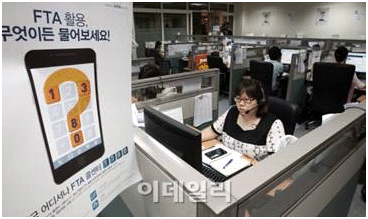
Market Information > Food News Clipping
Food News Clipping
June 25, 2013
2013.06.25
1. BILATERAL/MULTILATERAL ISSUES
¡®FTA Call Center¡¯ Opened, Korea Int¡¯l Trade Association [Korean, OSY]
http://news.naver.com/main/read.nhn?mode=LSD&mid=sec&sid1=101&oid=018&aid=0002799674

2. LIVESTOCK ISSUES
Growing Meat Consumption Increase Susceptibility to Cancer [English, CSY]
http://english.chosun.com/site/data/html_dir/2013/06/24/2013062400912.html
Full text: People are becoming more susceptible to certain forms of cancer and other diseases in their adult life as a consequence of their increased consumption of meat. The Ministry of Food and Drug Safety said Sunday that Koreans consumed about 44 kg of meat per person on average last year, up 22 percent from 36.8 kg in 2009. Pork was the most popular choice with 1.08 million tons consumed nationwide last year, followed by chicken (608,000 tons) and beef (488,000 tons).
"The more meat consumed, the greater the risk of suffering from colon cancer and other serious diseases in adulthood. As such, people are advised to pursue a more balanced diet," said the Korea Institute for Health and Social Affairs. Meat consumption has steadily risen over the past 40 years as per-capital income has shot up in line with the country's rapid economic growth. Back in 1970, when meat was considered a luxury that rarely appeared on the dinner table except for major holidays such as New Year's Day or Chuseok, Korean Thanksgiving, people ate just 5.2 kg a year. But that jumped eight-fold to 40.4 kg in 2011. The ministry said the growing popularity of dining out has also contributed to greater meat consumption.
Korean¡¯s Per Capita Meat Consumption Amounted to 44 Kg in 2012 ¡¦ Up 19% from 2009 [Korean, OSY]
http://news.donga.com/3/all/20130624/56064123/1
Summary: According to MFDS, total meat consumption in Korea amounted to 2.17 million tons in 2012. In other words, per capita meat consumption was 44 kilogram, up 19 percent from 2009. Pork was the most consumed meat in Korea at 1.08 million tons, followed by chicken (0.61 million tons) and beef (0.49 million tons). It was notable that duck meat showed the highest consumption growth in recent years. Per capita duck consumption more than doubled between 2006 (1.2 kg) and 2011 (3.1 kg).
3. MARKETING ISSUES
¡°We Do Not Carry Sharks fin¡±, Korean Air Carriers Declare [Korean, OSY]
http://news.donga.com/3/all/20130620/56011583/1
Summary: Korean Air, the leading air carrier in Korea announced on June 20 that it will not accept sharks fin shipments in its flights, following CITES rule. Asiana, the second largest air carrier in Korea also confirmed that it would continue to decline sharks fin shipments.
Limited Supply of Foreign Food Ingredients Restricts Korea¡¯s Plan to Increase Foreign Visitors for Medical Services [Korean, OSY]
http://www.hankyung.com/news/app/newsview.php?aid=2013062491921
Summary: The number of foreign travelers visiting Korea for medical services is showing a strong growth from 60,201 in 2009 to 155,672 in 2012. However, it is reported that the foreign visitors are not provided with enough foreign dishes due to limited supply of related foreign food ingredients such as specialty spices. Marketers point out that limited supply of foreign food ingredients can potentially restrict any further growth of foreign patients heading for Korea for medical services in the coming year.
The information in this report was compiled by the Agricultural Trade Office (ATO) at the U.S. Embassy in Seoul, South Korea. The press summaries contained herein do NOT reflect USDA, the U.S. Embassy, or other U.S. government agency official policy or view point. U.S. food exporters can learn more about market opportunities in South Korea by reviewing ATO Seoul¡¯s Exporter Guide and other reports available at www.fas.usda.gov by clicking on ¡°attaché reports
Agricultural Trade Office, U.S. Embassy - Seoul
Tel: 82-2-6951-6848 Fax: 82-2-720-7921
Email: atoseoul@state.gov